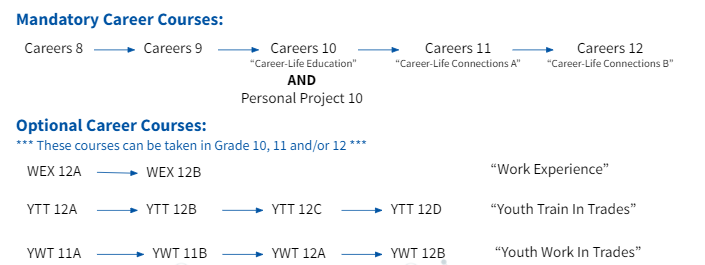
Career Programs
Career Programs
Through Career Education 8-12 students develop an awareness of their personal interests, strengths, and learning styles, as well as the roles and responsibilities of family, schools, and community.
Students will explore concepts such as identity, leadership, personal planning, and transferable skills. They will focus mainly on experience for transition out of secondary school. As students transition into the final stage of the Career Education curriculum, real-world experiences both within and outside the classroom environment provide meaningful opportunities for students to further develop and refine their understanding of career possibilities, through planning, practice, and application of competencies and knowledge.
Through enriching experiences, students will be able to make meaningful connections that will equip them with the competencies needed to fully participate in and contribute to their communities and beyond. Career Education will prepare students for managing their career and life transitions. Students will discover that careers are not simply occupational destinations, but a journey that involves lifelong planning and learning.
CAREER EDUCATION 8
(MCE-8)
Career-life development is an ongoing process of self-discovery, growth in competence, and learning from experiences in educational, work-related, and personal life contexts. In Career Education 8, students consider their strengths and preferences as they explore careers, and reflect on concepts such as identity, leadership, personal planning, and transferable skills. Students will complete tasks that help them self-assess, set goals, and reflect on their strengths and areas for growth. The ways in which family, mentors, and community networks support continued career-life development is a major theme throughout. Combined with MYP service as action, students are encouraged to explore experiential learning opportunities, and use their strengths to give back to the community.
CAREER EDUCATION 9
(MCE-9)
The Career Education 9 curriculum is delivered through a variety of presentations facilitated by teachers and guests in the community. This course is delivered in a hybrid format. Sessions are delivered both online and in-person. Career Education 9 introduces students to their preferred possibilities through service, skill development, goal setting, and career options. All Grade 9 students are expected to participate in the annual “Take our Kids to Work Day”.
Mentorship 10
This 4-credit course is designed for grade 10 students who have an interest in, and commitment to, fostering a peer-support network. The primary focus of the program is to ease the transition for students from Grade 7 to Grade 8. Mentors are matched with a group of Grade 8’s from the beginning of the school year and form connections with them through ongoing advisory sessions and various Grade 8 events throughout the school year. Mentors are selected the year before and register for this course to ensure a sustainable continuation of the mentor program. Students will take part in all of the Grade 8 events, attend outside the timetable biweekly training sessions and collaborate through Google suite to prepare for the various activities. The content of the course is focused on training mentors in order to improve their listening, responding, problem solving, presentation and interview skills that will be practiced through the experiential learning portion of this course. Mentors are expected to complete 50 hours of volunteer work both within the school and outside in the community.
NOTE: Mentors are selected through staff recommendations, an application, and an interview. After taking this course, students can continue on as a mentor leader by taking the Leadership 11/12 course. Volunteer hours accumulated in this course are not allowed to be used towards school service hours as they are, instead, used to give students credit for this course. Cost: $50 to cover t-shirt and event costs throughout the year.
CAREER LIFE EDUCATION (Grade 10)
(MCLE10 ~ 4 CREDITS)
The aim of Career Education is to support students in becoming successful, educated citizens by helping them learn how to effectively manage their life journey toward preferred future possibilities. This area of learning requires students to identify and develop their personal interests, passions, and competencies. Students reflect on learning experiences in their school and community, build confidence through their contributions, and explore multiple career-life roles and choices.
CAREER LIFE CONNECTIONS 12A (Grade 11)
(MCLCA12 ~ 2 CREDITS)
This course is designed to assist students to become self-directed individuals capable of setting goals and making appropriate decisions. In this course students will map out possible post-secondary opportunities and future transitions, understand the importance of Career Life Decisions including financial planning, family values, current market and labour trends, engage in and develop networks and opportunities by participating in at least 15 hours of experiential learning and develop employability skills. Students will also investigate and learn strategies for maintaining physical and mental well being and explore career-life opportunities including mentorship, experiential learning, service learning and volunteerism.
CAREER LIFE CONNECTIONS 12B (Grade 12)
(MCLCB12 ~ 2 CREDITS)
This course is designed to assist students to become self-directed individuals capable of setting goals and making appropriate decisions. In this course students will: Map out possible post-secondary opportunities and future transitions, understand the importance of Career Life Decisions including financial planning, family values, current market and labour trends, engage in and develop networks and opportunities by participating in at least 30 hours of experiential learning, attend career expos and develop employability skills. Students will also investigate and learn strategies for maintaining physical and mental well being and explore career-life opportunities including mentorship, experiential learning, service learning and volunteerism. Finally, students will develop and deliver a capstone, also known as a culminating project, experience, or celebration of learning, allowing them to demonstrate learning using an area(s) of interest, passion or strength. Ideally, the celebration of learning will be meaningful, relevant and useful in the transition beyond high school. Students will design, assemble, reflect and celebrate a capstone that will demonstrate personal learning and achievement (in and out-of-school), growth in the core competencies, and a reflection on their post-graduation plans.
WORK EXPERIENCE 12
(MWEX-12A and MWEX-12B, each 4 credits)
Work experience helps students transition from secondary school to the outside world, connecting classroom learning to the workplace and beyond. Students are expected to complete between 100-120 hours of paid or unpaid work at a variety of work or career placements; 30 hours of which must be volunteering in the school and/or community. This program is open to mature, responsible students in grade 11 and 12 (15 years of age or older). Notably, it is expected students will make reflective and meaningful connections to their educational and career planning through the experience gained on their work/career placements. Evaluation is based on completion of provincially mandated course requirements, quality of work placements, assignments and evaluations. By completing this course students will also meet the experiential learning requirements for Career Life Connections. In addition, as post-secondary institutions are turning to broad-based applications, it is imperative that students have created meaningful learning outside the classroom and these courses provide students with experiences for their applications.
Student responsibilities include (but not limited to):
- Finding a job placement (ask parents, relatives, friends for assistance)
- Attending seminars throughout the year specifically for WEX students
- Completing personality, learning and career assessment
- Maintain a work hours log for each placement
- Completion of Term Assignments including: Resume & Cover Letter, Mock Interview, WorkSafe, educational and career planning, job shadowing, employer evaluation
- Exit Interview
- Completion of a minimum of 100 hours of paid or unpaid work (hours are credited ONLY when proper paperwork is filed with an appropriately signed contract with the Career Centre and Advisor. No contract, no hours credited.
- 30 hours of total hours must be school or community-based volunteer work (10 hours for 2020-21)
YOUTH WORK IN TRADES 11/12
(MWRK-1A, MWRK-1B, MWRK-12A, MWRK-12B, each 4 credits)
This series of courses is intended for students who are interested in starting an apprenticeship in a recognized trade or field. Students can receive 4 credits for each 120 hours of paid work. Students may receive up to 16 credits while attending secondary school. Some students in this program may find that they are in the workplace for half of their school schedule but this is not required to participate in the program. While enrolled in the program students will attend meetings with the assigned teacher and the student will be responsible for maintaining contact throughout the year. Students must secure a paid job with a certified employer and then register with the ITA. The assigned teacher can assist with this process, but it is recommended that parents or guardians are involved in the initial steps of this program enrollment. More information about this option can also be found at www.itabc.ca. There is also the opportunity to qualify for a $1000 award. In order to qualify students must complete 900 apprenticeship hours, maintain a C+ average and be registered with the ITA.
